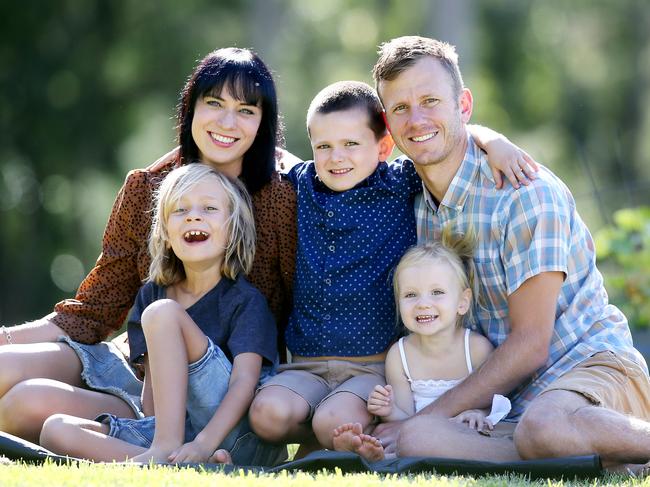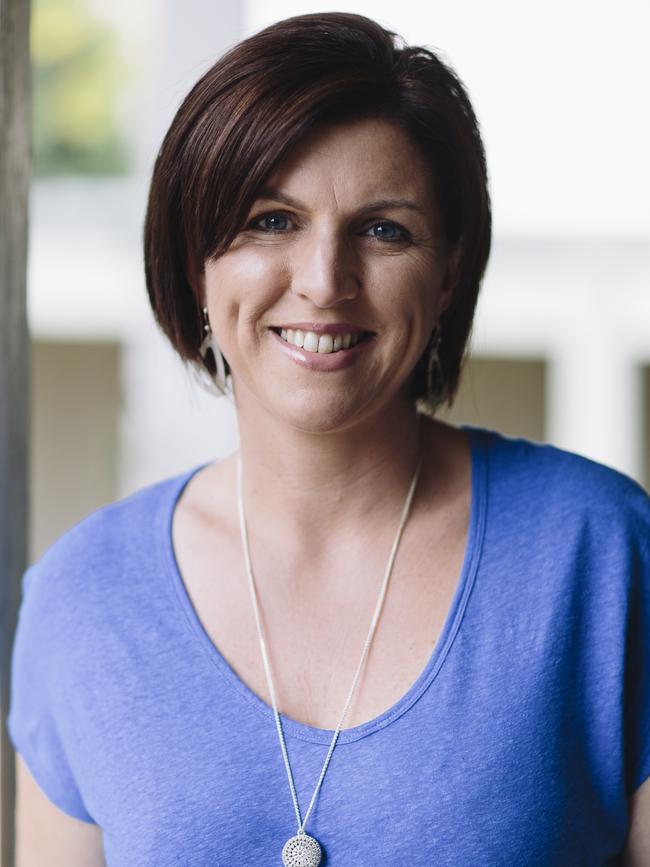Sexuality education: How parents can talk to kids about sex
The thought of talking to your young children about sex may make you squirm but it has never been more important than in our modern online world. Experts reveal the best way to talk to children about the birds and the bees.
It’s a tiny three-letter word that incites giggles from children through to abject panic in adults. Experts say sex education, or sexuality education as it is now being called, is just as important in the school curriculum as English, maths and history.
In an age when children as young as five are often allowed unsupervised access to smart phones and Wi-Fi-enabled devices, what we teach children about sex, sexuality and healthy relationships is more important than ever.

Experts agree all children should have healthy and age-appropriate sexuality education and that it should come from their parents in conjunction with the school. If it doesn’t, they say, curious children may satisfy their curiosity online — and through pornography.
Nearly half of all children aged 9-16 had experienced regular exposure to sexual images, the Australian Institute of Family Studies found in 2016.
“In the absence of other information, pornography can be the main source of a young person’s sex education,” the institute’s report The Effects Of Pornography On Children And Young People reveals.
MORE FROM MERCEDES MAGUIRE:
WHY CRUISING IS SO POPULAR WITH AUSSIE FAMILIES
HOW TO ENSURE CHILD VEGETARIANS ARE HEALTHY
Your Choicez director David Kobler says parents need to break down any apprehension they may feel about sex and sexuality in order to effectively communicate with their children.
“Parents grew up in a generation when sex was seen as taboo and it was never spoken about, so they feel it is inappropriate to talk about sex, sexting or pornography with their child,” he tells BW Magazine.
“Parents hand their child a device and allow them to go into their room to use it — they may as well be dropping them off in the middle of a red light district and driving off. One child in one night could access more pornography than their ancestors could in one lifetime, that’s the reality in our digital world.”

Kobler, who has presented seminars on dating, sex and relationships before half a million kids in high schools throughout Australia and New Zealand, says parents need to bridge the gap on what children are taught in school.
“The longer you wait to start a conversation with your kids about sexuality, the harder it will get,” says Kobler, who believes age-appropriate discussions can start in early primary school.
“Parents need to talk with their children about these topics in primary school, and before devices are given to them. Start early with conversations about the body, what’s private and what’s not.
“You don’t have to sit down and have a hyper-sexualised talk.”
In NSW, it is mandatory for all children to receive sex education under the umbrella of personal development, health and physical education (PDHPE) from Year 5 through to Year 10.
Schools have the option of implementing a wellbeing program aimed at older children in Years 11 and 12.

While all high school teachers are PDHPE-trained and all primary school teachers are trained on how to deliver the syllabus, schools also have the option to outsource further instruction.
Vanessa Hamilton, a sexual health nurse of 24 years and a sexuality educator of 16 years, provides seminars to parents and their children.
“Most adults tell me they have never had sexuality education,” she says.
“And they lack the language to talk to their children on the topic. Rather than talking about sexuality in a positive way, empowering and pleasurable, their approach is one of fear and danger.”
Hamilton says the thing parents are most concerned about when talking to their children about sexuality is that it will be embarrassing, that they will say the wrong thing and that they may encourage their child to become more curious about sex.
“I hear the excuse from parents all the time, ‘But my child hasn’t asked me anything’ and so I encourage them to be an askable parent,” Hamilton says.
And rather than ask their parents, children may be seeking answers from other sources — much like in Netflix series Sex Education in which high school student Otis, whose mother is a sex therapist and only too willing to discuss the topic with him, opens his own sex therapy clinic at school, doling out advice in a bid to become popular.

Hamilton asks: “Who do they want their child to get their education on this topic from: Johnny in the playground, pornography, Love Island, social media or their parent?
“It’s everyone’s role in society to provide our children with the right sexuality education but it is a parent’s responsibility. We make sure they eat healthy, learn to ride a bike and have road safety but sexuality education needs to be a part of that too.”
Hamilton says while the school education around sexuality is still “vague” it has changed from being science-based to health and physical education-based, which is a slight improvement.
In England, proposed changes to the way children are taught about sex in schools will include an emphasis on equality and LGBTIQ inclusion, as well as topics on the digital world and sexting, pornography and online bullying and sexual harassment.
It will bring them into line with progressive countries, Sweden and Denmark, and it is a move Hamilton would like to see mirrored in Australia.
“What I would like is to see it taught from a place of positivity, inclusive of diversity, accurate, that sex can be pleasurable and fulfilling and should be consenting and respectful,” she says.
Kobler and his wife Katie have three young kids — Kingsley, 8, Miles, 5, and India, 2 — and they have already started talking to their eldest two about sexuality.
“Our approach when we are asked a question is to be honest, to give an answer that sounds right and to make sure it’s age appropriate,” Katie says.
“And let them lead the conversation with their questions.”
A POSITIVE APPROACH
Starting a conversation about sexuality with your child can be daunting. Health nurse and sexuality educator Vanessa Hamilton says conversations about sexuality need to be ongoing and consistent, not a one-time birds-and-the-bees-style talk.
She recommends parents look for teachable moments in their everyday lives; a song lyric, a billboard or ad, a TV show or something someone said.
When talking to your child about sexuality, she says it can help to remember the acronym PRAISE to help guide the conversation.

Be Positive: Appear happy to be answering their questions. You might say something like ‘That is a great question, tell me what you know about that?’ to help get the conversation started.
Talk about Respectful Relationships: This should be at the core of your discussions on sexuality. Base all your discussions on respect for others.
Always be Accurate: Avoid joking to cover up your embarrassment. And always try to use correct terminology, especially for body parts.
Research shows children who know the correct terminology for their body are less likely to be sexually abused, according to the Australian Institute of Health and Welfare. Empowering children, the AIHW states, means that they are less likely to be vulnerable to predators.
Add Information: Families have their own set of beliefs and values. Make sure you pepper your conversations with information — you need to tell your child what you expect of them and what you consider appropriate behaviour.
Keep it Simple: Be brief and factual and stick to the topic they are asking you about.
Be Empowering: Provide solutions that will give your child confidence in social situations — for example, tell them to turn off the screen if they don’t like what they see. And remind them that they can tell or ask you anything.

BIRDS AND THE BEES
Baby/toddler: Use opportunities such as bath time and nappy changes to teach your bub about body parts, and make sure you use correct terminology such as penis and vulva.
Preschool: Talk about the difference between boys and girls and introduce the concept that some body parts are private and we need to respect each other’s privacy.
Primary: Teach them bodies come in all shapes, colours and sizes. Start conversations about what the reproductive organs do. From about nine, start preparing them for puberty and how their body will change.
Adolescence: Sex education gets sexual and topics can include dating, contraception, when to have sex and consent.
* Cath Hakanson is a nurse, author and educator at Sex Ed Rescue



